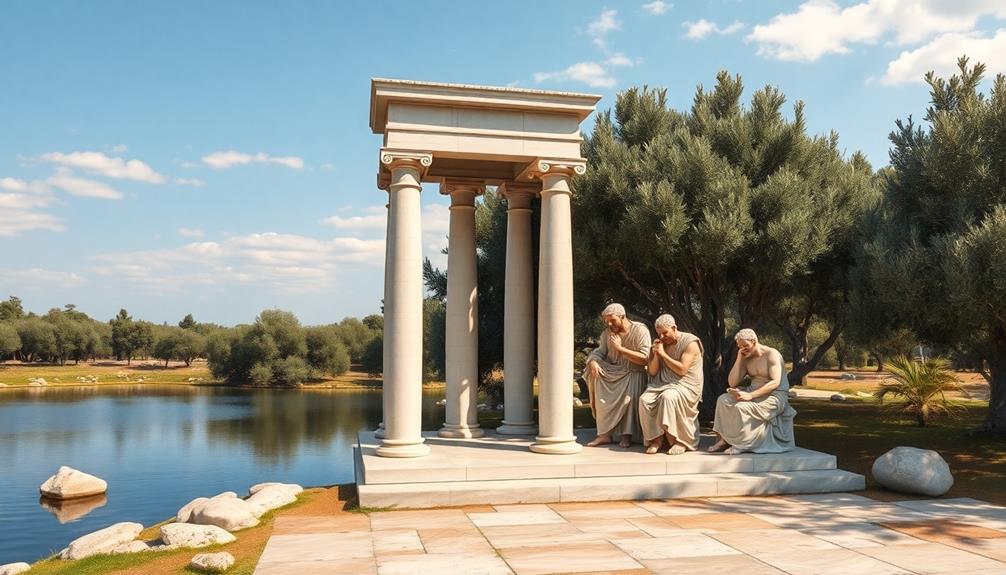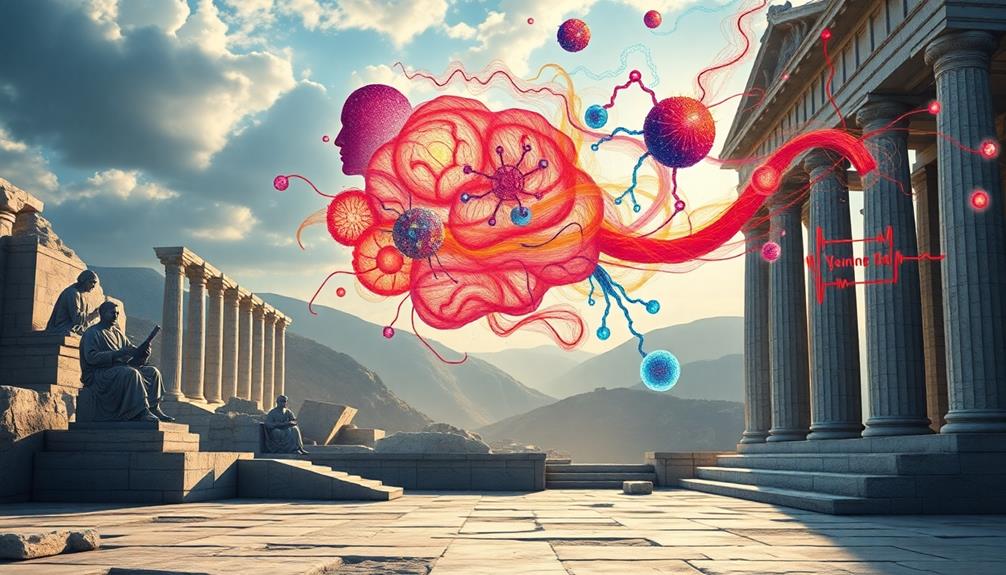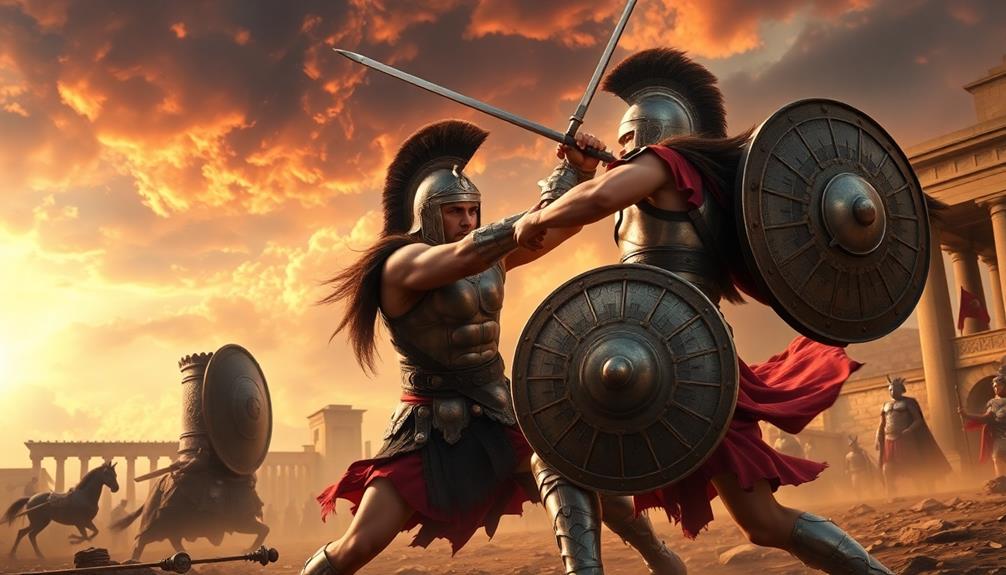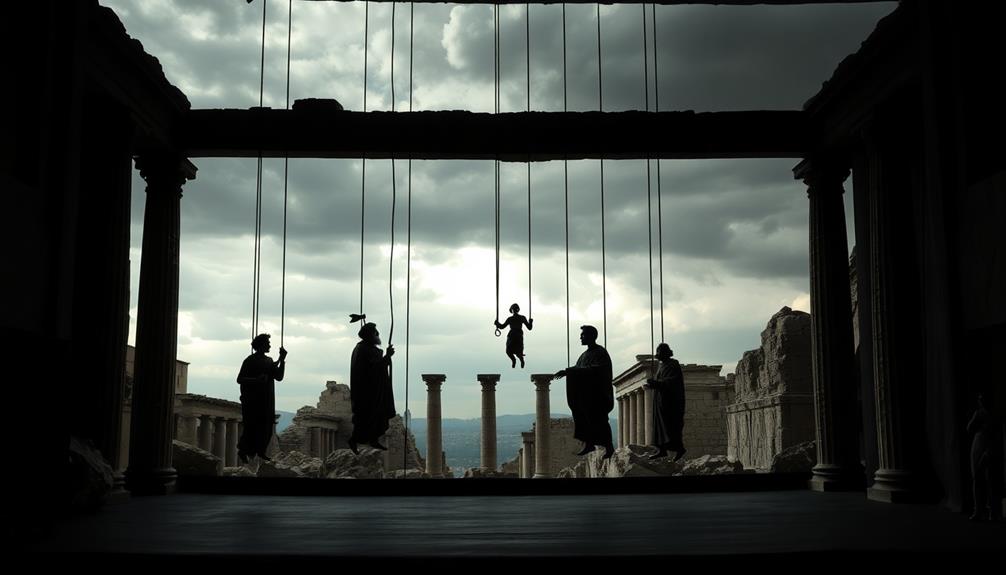The Greeks saw understanding human nature as pivotal for ethical living. You'd find that Plato's tripartite soul divides us into the rational, spirited, and appetitive parts, while Aristotle focuses on rationality as unique to humans. Their myths illustrate human flaws, like pride and overconfidence, revealing deeper truths about our nature. Stoicism teaches emotional control and resilience, helping you manage desires and thoughts effectively. Both philosophers laid the groundwork for modern psychology, highlighting the importance of self-awareness. If you're interested, there's much more about their insights waiting for you to explore.
Key Takeaways
- Greek philosophers emphasized self-awareness and emotional control as essential for understanding human nature and achieving ethical living.
- Plato's tripartite soul model highlights the balance between desires, courage, and reason for inner harmony.
- Aristotle categorized the soul into vegetative, appetitive, and rational, stressing the uniqueness of human rationality.
- Stoicism advocates for emotional resilience through rational thought, focusing on perception to manage desires and reactions.
- Myths illustrate human flaws, emphasizing introspection and moral responsibility in navigating life's challenges.
Greek Philosophers and Human Nature

Greek philosophers profoundly shaped our understanding of human nature by exploring its complexities and implications for ethical living. You'll find that figures like Socrates emphasized the importance of self-awareness through the Socratic method, which encourages you to question your beliefs and examine your life. This pursuit of wisdom isn't just academic; it's about achieving eudaimonia, or true human flourishing.
Plato's view of human nature presents a tripartite soul—desiring, courageous, and reasonable—where he argues that reason must lead for harmony and ethical behavior.
In contrast, Aristotle connects human nature directly to the body, categorizing the soul into vegetative, appetitive, and rational parts. He believes that the rational aspect is unique to you and essential for acquiring knowledge and virtue.
Stoic philosophers, like Epictetus and Seneca, teach that human suffering arises from unchecked desires and emotions. They advocate for emotional control and rational thought as pathways to inner peace.
The Delphic maxim "Know Thyself" captures the essence of Greek Philosophy, illustrating that self-awareness is crucial for understanding the intricacies of human nature and living ethically.
The Concept of the Soul

Understanding human nature leads us to explore the concept of the soul, a central theme in Greek philosophy. Both Plato and Aristotle offered profound insights into the soul's nature and its impact on moral responsibility. Plato viewed the soul as immortal and divided it into three parts: desiring, courageous, and reasonable. He believed that harmony occurs when reason governs desires and courage. In contrast, Aristotle saw the soul and body as interrelated, categorizing the soul into vegetative, appetitive, and rational parts, with rational thought being unique to humans.
The table below highlights their views and emphasizes the soul's significance in achieving eudaimonia:
| Plato | Aristotle |
|---|---|
| Soul is immortal | Soul and body are interrelated |
| Emphasizes harmony through reason | Focuses on empirical observation |
| Knowledge connects to virtue | Rational thought drives morality |
Both philosophers argue that the soul's condition influences ethical behavior, illustrating the balance between reason and passion. This duality enhances our understanding of human nature and our quest for eudaimonia.
Myths Reflecting Human Flaws

Often, myths reveal deep insights into human flaws, illustrating the complexities of our nature. The ancient Greeks understood hamartia, or tragic flaws, as essential traits that shaped their heroes. Characters like Achilles and Odysseus exemplify how excessive pride and hubris can lead to downfall.
For instance, the myth of Icarus serves as a cautionary tale; his overconfidence in flying too close to the sun results in a tragic fall when his wax wings melt away.
In contrast, Prometheus embodies the consequences of defying divine boundaries. His ambition to steal fire for humanity highlights the Greeks' belief that human folly often invites punishment.
Similarly, Oedipus's journey illustrates the interplay of fate and human error. His relentless quest for truth leads to self-destruction, demonstrating that ignorance can bring about tragic outcomes.
These myths consistently emphasize the necessity of balance within human nature. Plato's charioteer metaphor perfectly captures this inner conflict between reason and passion, underscoring the idea that understanding our flaws is essential.
Ultimately, these stories reflect a profound recognition that human nature is inherently flawed and requires introspection and control to avoid tragic consequences.
Ethical Frameworks in Ancient Greece

In Ancient Greece, you'll find that ethical frameworks revolve around the idea that virtue is tied to knowledge.
Socrates argues that understanding is essential to ethical living, while Stoics emphasize emotional self-control as a pathway to virtue.
These perspectives show how Greeks believed that a well-examined life leads to true fulfillment.
Virtue as Knowledge
Knowledge serves as the cornerstone of virtue in ancient Greek ethical thought, illustrating a profound connection between moral excellence and intellectual understanding.
Plato believed that to achieve virtue, one must engage in self-examination and pursue knowledge. He argued that the ultimate goal of existence is the understanding of the Good, linking ethical behavior directly to this quest for higher truths. This pursuit fosters not only moral excellence but also human flourishing.
Socrates emphasized that ignorance is the root of wrongdoing, urging you to seek wisdom as a pathway to eudaimonia. By understanding the nature of virtue, you can cultivate ethical behavior and avoid the pitfalls of moral failure.
Aristotle expanded this concept, suggesting that ethical virtue isn't just about knowledge but also about practice. He categorized virtues as mean states between excess and deficiency, highlighting the importance of reason and habitual action in achieving moral excellence.
Even the Stoics recognized knowledge's essential role in virtue, promoting rational thought and emotional regulation as means to maintain moral integrity.
In this way, the Greeks established a framework where knowledge isn't merely an intellectual pursuit but a fundamental element in the cultivation of virtue and ethical living.
Emotional Self-Control
Emotional self-control is an essential element in the ethical frameworks of ancient Greece, particularly within Stoicism. This philosophy emphasizes that mastering your emotions through rational thought leads to inner peace and freedom from the turmoil of excessive desires. Greek philosophers like Epictetus argued that your perception greatly influences emotional disturbances. By adopting a rational approach, you can better manage your reactions and feelings.
The Stoic practice of "negative visualization" serves as a powerful tool for fostering resilience. By mentally preparing for potential challenges, you build emotional strength to face adversity.
Similarly, Aristotle's concept of the "golden mean" suggests that virtue exists between extremes, advocating for moderation in your emotions and desires to achieve ethical balance and personal flourishing.
Moreover, Socratic and Platonic teachings highlight the need for self-examination and intellectual growth as crucial pathways to mastering your emotions. Aligning your feelings with reason and virtue is a recurring theme in these frameworks.
In traversing life's complexities, emotional self-control not only enhances your character but also paves the way for a more harmonious existence, reflecting the profound insights of ancient Greek thought.
Stoicism and Emotional Resilience

Stoicism offers a powerful framework for building emotional resilience in today's chaotic world. Founded by Zeno of Citium, Stoicism teaches you to harness rational thought and accept your circumstances. By focusing on what you can control, you learn to manage excessive desires and emotions, which are often the root causes of suffering.
Key Stoic figures like Epictetus emphasized that perception shapes your emotional responses. If you can change your thoughts, you can change your feelings. This idea encourages you to examine your beliefs and cultivate inner peace, or ataraxia, by maintaining self-control and practicing virtue.
As you embrace Stoicism, you'll find that emotional resilience isn't just about enduring life's challenges; it's about thriving in spite of them. By fostering a consistent mindset grounded in rationality, you develop the ability to face adversity without being overwhelmed.
This approach aligns closely with modern cognitive behavioral therapies, reinforcing the importance of evaluating your thoughts for greater well-being. Ultimately, Stoicism empowers you to lead a fulfilling life, no matter the external storms you may face.
Influence on Modern Psychology

Ancient Greek philosophers laid the foundation for many ideas in modern psychology that you might recognize today.
Their focus on self-knowledge and emotional regulation offers techniques still relevant in therapeutic practices.
Ancient Philosophers' Insights
Understanding human nature has long been a pursuit that shapes our perspectives on psychology today. Ancient Greece set the stage for this exploration, with philosophers like Socrates emphasizing self-knowledge and critical thinking as essential tools for personal growth. His teachings encouraged you to dig deeper into your thoughts and motivations, paving the way for modern introspective practices.
Plato's Theory of Forms contributed to understanding human ideals, suggesting that grasping these concepts could lead to ethical behavior and self-actualization. Aristotle further refined this by categorizing the soul into rational, appetitive, and vegetative parts, offering a framework for interpreting human motivation and behavior that resonates with contemporary personality theories.
Additionally, Stoic philosophers like Epictetus focused on perception's role in emotional disturbances, laying groundwork for cognitive behavioral therapy's emphasis on thought patterns.
The Delphic maxim "Know Thyself" remains relevant, underscoring the importance of self-awareness in both ancient and modern psychological practices. By embracing these insights, you can foster personal development and improve mental well-being, showing just how influential these ancient thinkers continue to be in today's psychological landscape.
Emotional Regulation Techniques
The insights from Greek philosophers laid a solid foundation for techniques in emotional regulation that are relevant in modern psychology. Stoicism, in particular, introduced emotional regulation techniques that emphasize the power of your perceptions.
Epictetus taught you that your thoughts shape your emotional responses, urging you to engage in rational thought to mitigate emotional disturbances. By practicing cognitive reframing, you can alter how you view situations, fostering resilience against negative emotions. Additionally, understanding the importance of free SEO keywords acquisition can help in crafting content that resonates emotionally with your audience, enhancing the overall impact.
One effective Stoic practice is "premeditatio malorum," where you mentally prepare for potential misfortunes. This technique helps you cultivate emotional strength and reduce anxiety about future events.
The interplay between logos (reason) and pathos (emotion) in Stoic thought highlights how logical reasoning can guide your emotional responses, promoting a balanced psychological state.
Additionally, philosophers like Socrates and Aristotle contributed to concepts of self-awareness and self-control, which have evolved into modern cognitive behavioral therapies.
Frequently Asked Questions
What Did the Greeks Believe About the Human Mind?
The Greeks believed the human mind's a complex mix of rational and irrational elements. They emphasized that understanding this interplay leads you to wisdom, virtue, and emotional control, guiding ethical behavior and personal growth.
How Did the Ancient Greeks View Nature?
The ancient Greeks saw nature as a divine reflection, interconnected with human existence. They believed it taught virtue, revealed human flaws, and served as a backdrop for struggles, emphasizing fate and morality in life's journey.
How Did the Greeks Portray Humans?
Like a tragic hero in a play, the Greeks portrayed humans as flawed beings, grappling with hubris and fate. They emphasized the struggle for virtue, wisdom, and the balance between reason and passion in life.
What Are the Classical Greek Views of a Human Person?
Classical Greeks see a human person as a complex being driven by reason and passion. They emphasize the importance of self-knowledge, virtue, and balance to achieve happiness, viewing human nature as tragically flawed yet inherently aspiring for excellence.
Conclusion
In exploring how the Greeks viewed human nature, you uncover a rich tapestry woven with threads of philosophy, myth, and ethics. Their insights on the soul and emotional resilience illuminate the depths of your own psyche, inviting you to reflect on your strengths and flaws. Just like a sculptor chiseling away at marble, you can shape your understanding of yourself, molding your character through the wisdom of the ancients, and forging a path to emotional clarity and strength.









